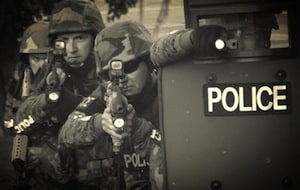
Secret police are characteristic of dictatorships, or so goes the conventional thinking on the subject. Police in democracies operate for the most part transparently and within a set of rules and guidelines that limits their ability to gratuitously punish citizens who have done nothing wrong. If a policeman operating under rule-of-law steps out of line, he can be held accountable. That is also conventional thinking.
But what happens when an ostensibly “democratic” police force becomes corrupted and starts doing things that are outside its zone of responsibility, and does so to benefit a political relationship that will in turn protect those who have broken the law under cover of carrying out their official duties? That is the characteristic of what we have been calling a “deep state,” where forces drawn generally from the political class and security services conspire together to control what the public is allowed to know while also manipulating nuisances like elections to make sure that the “correct” outcome emerges.
Indeed, deep state operating in a democracy or republic is far more dangerous that the secret police in a dictatorship. That is because in a system where the forces of the state are all-powerful, nearly everyone expects that what they read and what the government says is all a lie. In a democratic system there is what intelligence officers would refer to as plausible denial, which means that even when the government is behaving very badly much of the public will believe that it is acting honorably because they want to trust that the system works. And when the deep state includes management of the media, many citizens will likewise believe what they are reading or hearing is honest reporting, even when it is not.
Due to the events of the past year in particular, many Americans have become convinced that there now exists something like a secret police operating in the United States that is a fusion of some political dealmakers with certain politicized elements in the intelligence and security services. However one regards President Donald Trump and his former National Security Adviser Michael Flynn, there is nevertheless something odd in terms of how they have been investigated and, in the case of Flynn, legally entrapped to convict him of lying to the FBI to force him to cut a deal with the Special Counsel inquiry headed by Robert Mueller.
Consider how, even though meeting with Russians is not illegal, Trump and his associates have been subjected to secret investigation of their Russian ties for nearly two years without any revelations apart from the fact that it was Israel, not Russia, that colluded to undermine White House policy. FBI Director James Comey’s antics during the primaries and electoral campaign, in which he first exonerated and then complained about Hillary Clinton while at the same time validating a dossier full of largely questionable information about Donald Trump’s dealings with Russia provides clear evidence of an organization that has lost its bearings and has become a politicized agent of an incumbency that has itself become corrupted and believes itself to be above the law. And then there is the Central Intelligence Agency’s own John Brennan working with the FBI to undermine the Trumps, illegally digging up dirt from the liaison intelligence partners in Europe and the Middle East.
America’s law enforcement empire has all the characteristics of secret police in a dictatorship. It is not transparent in its actions, has a history of bending the rules to obtain convictions, and its officers are rarely held accountable. It has also been politicized. And to be sure, one should recognize that there are two additional factors driving the growth and transformation of the national security state in the U.S. First is the intense dislike that the top levels of the American intelligence and police agencies have for Donald Trump personally, a contempt that Trump himself has largely earned by his scorn for much of the government that he inherited. Second is the “trust the authorities” culture that has grown up since 9/11, reinforced by fearmongering on the part of the government to justify executive overreach and enabled through anti-terror legislation that has unleashed the CIA, FBI and National Security Agency (NSA) to act with impunity while suffering no consequences whatsoever.
Reprinted with permission from Strategic Culture Foundation.

